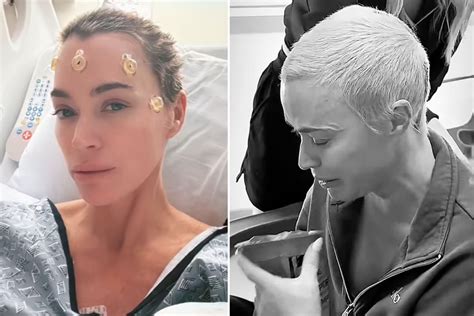
Teddi Mellencamp, reality TV personality and health advocate, is experiencing a recurrence of headaches and seeking medical guidance, months after undergoing successful neurosurgery to address previous neurological issues.
Teddi Mellencamp, known for her appearances on “The Real Housewives of Beverly Hills,” provided an update on her health, revealing the return of persistent headaches that have prompted her to consult with medical professionals. This health update comes on the heels of a prior medical journey involving neurosurgery, during which Mellencamp underwent a procedure to address specific neurological concerns. The reality star has been candid about her health experiences and continues to share updates with her followers as she navigates this latest chapter.
Mellencamp took to social media to share her recent health challenges, expressing both concern and determination in her approach to managing her well-being. In an Instagram story, she disclosed, “Dealing with another headache. It’s back. Seeing a doctor tomorrow.” The transparency and openness in sharing her health journey has made her a relatable figure for many who also deal with chronic health conditions.
Months prior, Mellencamp had revealed she underwent neurosurgery to address a previously diagnosed medical issue. While she has not publicly specified the exact nature of the initial neurological problem, she has been forthcoming about the positive outcomes of the procedure and the impact it had on improving her overall quality of life. Following the surgery, Mellencamp expressed gratitude for the medical team and the support she received from family, friends, and fans.
The recent reappearance of headaches has prompted Mellencamp to seek prompt medical attention, demonstrating a proactive approach to address any potential underlying causes. She emphasized the importance of early diagnosis and intervention, especially in cases where symptoms recur or persist. Details about the specific symptoms, diagnostic tests, and treatment options are expected to emerge as she continues to engage with medical professionals and receive further evaluation.
Mellencamp’s health journey has been marked by moments of vulnerability, strength, and resilience. Her willingness to share personal experiences, struggles, and triumphs has resonated with a broad audience, inspiring others to prioritize their health and seek appropriate medical care. As she continues to navigate the recurrence of headaches, her supporters are providing encouragement and well wishes, emphasizing the importance of self-care, advocacy, and ongoing communication with healthcare providers.
The health challenges faced by Teddi Mellencamp provide a broader perspective on the prevalence of neurological conditions and the importance of comprehensive medical evaluations. Headaches, in particular, are a common symptom that can indicate various underlying health issues, ranging from mild to severe. Recurrent or persistent headaches may warrant further investigation to identify the root cause and implement effective treatment strategies.
Teddi Mellencamp’s public disclosure of her health challenges serves as an opportunity to raise awareness about neurological health, encouraging others to prioritize early detection, treatment, and ongoing management of such conditions. The support and engagement she receives from her followers demonstrate the power of community and the importance of shared experiences in navigating personal health journeys.
Teddi Mellencamp’s commitment to maintaining open communication about her health journey underscores the significance of self-advocacy and the need to empower individuals to take an active role in their healthcare decisions. Her willingness to share updates, seek medical guidance, and advocate for her well-being serves as a testament to her strength, resilience, and dedication to overall health.
In-Depth Analysis
Teddi Mellencamp’s situation highlights several crucial aspects of healthcare and the patient experience. First, it underscores the reality that even successful medical interventions do not always guarantee a permanent resolution of health issues. Recurrence of symptoms, as in Mellencamp’s case, can be a common occurrence in many chronic conditions, requiring ongoing management and vigilance.
Second, Mellencamp’s proactive approach to seeking medical attention demonstrates the importance of early diagnosis and intervention. By promptly addressing the return of her headaches, she is taking steps to identify any potential underlying causes and implement appropriate treatment strategies. This approach can help prevent the condition from worsening and improve her overall prognosis.
Third, Mellencamp’s transparency about her health challenges helps to destigmatize neurological conditions and encourages others to seek help when needed. Her openness can inspire individuals to prioritize their health, communicate openly with healthcare providers, and advocate for their well-being.
Background Information on Headaches
Headaches are a common medical complaint, affecting millions of people worldwide. They can manifest in various forms, ranging from mild tension headaches to severe migraines. Headaches can be caused by a variety of factors, including stress, dehydration, lack of sleep, and underlying medical conditions.
There are several different types of headaches, including:
-
Tension Headaches: These are the most common type of headache, characterized by mild to moderate pain that feels like a tight band or pressure around the head.
-
Migraines: Migraines are severe headaches that can cause throbbing pain, nausea, vomiting, and sensitivity to light and sound.
-
Cluster Headaches: Cluster headaches are intense headaches that occur in clusters, with multiple headaches occurring over a period of days or weeks.
-
Sinus Headaches: Sinus headaches are caused by inflammation or infection of the sinuses, and they can cause pain and pressure in the face, forehead, and around the eyes.
Recurrent or persistent headaches may warrant further investigation to identify the underlying cause and implement effective treatment strategies. Diagnostic tests may include a physical exam, neurological exam, imaging studies (such as MRI or CT scan), and blood tests.
Broader Context of Neurological Health
Neurological health encompasses the overall well-being of the brain, spinal cord, and nerves. Neurological disorders can affect a wide range of functions, including movement, sensation, cognition, and behavior. These conditions can have a significant impact on an individual’s quality of life and may require specialized medical care.
Common neurological disorders include:
-
Stroke: A stroke occurs when blood flow to the brain is interrupted, causing brain damage.
-
Epilepsy: Epilepsy is a neurological disorder characterized by recurrent seizures.
-
Multiple Sclerosis (MS): MS is an autoimmune disease that affects the brain and spinal cord, causing a variety of symptoms, including fatigue, numbness, and vision problems.
-
Parkinson’s Disease: Parkinson’s disease is a progressive neurological disorder that affects movement, causing tremors, stiffness, and balance problems.
-
Alzheimer’s Disease: Alzheimer’s disease is a progressive neurological disorder that affects memory, thinking, and behavior.
Early detection, diagnosis, and treatment are crucial for managing neurological disorders and improving patient outcomes. Advances in medical technology and research have led to new and improved treatments for many neurological conditions.
The Role of Support Systems
Teddi Mellencamp’s health journey highlights the importance of support systems in navigating health challenges. The support she receives from family, friends, and fans can provide emotional comfort, encouragement, and practical assistance. Strong support networks can help individuals cope with the stress and uncertainty associated with health conditions, improve their overall well-being, and promote positive health outcomes.
In addition to personal support networks, there are also numerous organizations and resources available to provide information, support, and advocacy for individuals with neurological conditions. These organizations can offer valuable information about specific conditions, treatment options, and coping strategies. They can also provide opportunities for individuals to connect with others who share similar experiences, creating a sense of community and reducing feelings of isolation.
Quotes from the Original Source
- “Dealing with another headache. It’s back. Seeing a doctor tomorrow.” – Teddi Mellencamp via Instagram story.
Expanding on Teddi Mellencamp’s Previous Neurosurgery
While the specific details of Teddi Mellencamp’s previous neurosurgery remain undisclosed, it’s important to consider the breadth of conditions that might necessitate such a procedure. Neurosurgery encompasses a wide range of surgical interventions aimed at treating disorders affecting the brain, spinal cord, and peripheral nerves. These conditions can range from tumors and aneurysms to nerve compression and traumatic injuries.
Given Mellencamp’s disclosure of subsequent headaches, it’s plausible to speculate that her previous surgery addressed a condition that could potentially have recurring symptoms. For example, some individuals who undergo surgery for Chiari malformation (a condition where brain tissue extends into the spinal canal) may experience recurrent headaches even after successful surgical decompression. Similarly, individuals who have undergone surgery for certain types of nerve compression may experience a return of symptoms if the underlying cause is not fully addressed or if new areas of compression develop.
It is crucial to emphasize that this is purely speculative, as the exact nature of Mellencamp’s condition and surgery has not been publicly revealed. However, understanding the potential for recurrence in certain neurological conditions provides valuable context for her current health concerns.
The Importance of Advocacy in Healthcare
Teddi Mellencamp’s willingness to share her health journey underscores the critical role of advocacy in healthcare. Patient advocacy involves taking an active role in one’s own healthcare decisions, seeking information, asking questions, and communicating openly with healthcare providers. Self-advocacy can empower individuals to make informed choices about their treatment options, ensure that their needs and preferences are respected, and improve their overall health outcomes.
In Mellencamp’s case, her decision to seek prompt medical attention for the return of her headaches demonstrates a commitment to self-advocacy. By proactively addressing her symptoms and consulting with medical professionals, she is taking steps to ensure that her health concerns are properly evaluated and managed.
Moreover, Mellencamp’s public disclosure of her health challenges can serve as a form of advocacy for others who may be facing similar situations. By sharing her experiences, she can raise awareness about neurological conditions, encourage others to seek help when needed, and promote open communication between patients and healthcare providers.
The Broader Impact of Social Media on Health Awareness
Teddi Mellencamp’s use of social media to share her health updates reflects a growing trend of individuals using online platforms to connect with others, share their experiences, and raise awareness about various health issues. Social media can be a powerful tool for disseminating information, promoting health education, and fostering a sense of community among individuals who share similar health concerns.
However, it is also important to acknowledge the potential downsides of using social media for health-related purposes. Misinformation and unverified claims can spread rapidly online, potentially leading to confusion and anxiety. It is crucial to rely on credible sources of information and consult with healthcare professionals before making any decisions about one’s health.
In Mellencamp’s case, her use of social media to share her health journey can be seen as a positive example of using online platforms to raise awareness and connect with others. However, it is important for her followers to remember that her experiences are personal and may not be representative of everyone’s situation. It is always best to consult with a healthcare professional for personalized medical advice.
The Psychological Impact of Chronic Health Conditions
Living with a chronic health condition, such as recurrent headaches, can have a significant impact on an individual’s psychological well-being. Chronic pain, uncertainty about the future, and limitations on daily activities can contribute to feelings of stress, anxiety, and depression. It is important to address the psychological aspects of chronic health conditions in addition to the physical symptoms.
Psychological support can include therapy, counseling, and support groups. These interventions can help individuals cope with the emotional challenges of living with a chronic health condition, develop coping strategies, and improve their overall quality of life.
Teddi Mellencamp’s commitment to seeking medical attention for her recurrent headaches suggests that she is taking a holistic approach to her health, addressing both the physical and psychological aspects of her condition. This comprehensive approach is essential for managing chronic health conditions effectively and improving overall well-being.
The Future of Neurological Research and Treatment
Neurological research is a rapidly advancing field, with new discoveries and innovations constantly emerging. These advances hold promise for improving the diagnosis, treatment, and prevention of neurological disorders.
Some of the most promising areas of neurological research include:
-
Gene Therapy: Gene therapy involves introducing genes into cells to treat or prevent disease. This approach has the potential to revolutionize the treatment of many neurological disorders, including genetic conditions such as Huntington’s disease and spinal muscular atrophy.
-
Stem Cell Therapy: Stem cell therapy involves using stem cells to replace damaged or diseased cells in the brain and spinal cord. This approach has the potential to regenerate damaged tissue and restore function in individuals with stroke, spinal cord injury, and other neurological disorders.
-
Immunotherapy: Immunotherapy involves using the body’s own immune system to fight disease. This approach has shown promise in the treatment of certain neurological disorders, such as multiple sclerosis and autoimmune encephalitis.
-
Brain-Computer Interfaces (BCIs): BCIs are devices that allow individuals to control external devices, such as computers and prosthetic limbs, using their brain activity. BCIs have the potential to restore communication and mobility in individuals with paralysis and other severe neurological impairments.
These advances in neurological research offer hope for improving the lives of millions of people affected by neurological disorders.
Frequently Asked Questions (FAQ)
-
What condition did Teddi Mellencamp previously have neurosurgery for?
- The specific condition that necessitated Teddi Mellencamp’s previous neurosurgery has not been publicly disclosed.
-
What symptoms is Teddi Mellencamp currently experiencing?
- Teddi Mellencamp is currently experiencing a recurrence of headaches.
-
What is Teddi Mellencamp doing to address her current health concerns?
- Teddi Mellencamp is seeking medical attention and consulting with a doctor to address the return of her headaches.
-
Why is Teddi Mellencamp sharing her health updates on social media?
- Teddi Mellencamp is sharing her health updates to be transparent about her health journey and to raise awareness about health issues. She also connects with others who may be experiencing similar challenges.
-
What can individuals do if they are experiencing recurrent or persistent headaches?
- Individuals experiencing recurrent or persistent headaches should seek medical attention to identify the underlying cause and implement effective treatment strategies. A doctor can perform a thorough evaluation and recommend appropriate diagnostic tests and treatment options.
In conclusion, Teddi Mellencamp’s health update regarding the return of her headaches highlights the ongoing nature of managing health conditions, the importance of proactive medical care, and the role of public figures in raising awareness about health issues. Her transparency and willingness to share her experiences can inspire others to prioritize their health and seek appropriate medical care when needed. The broader context of neurological health and the advances in research and treatment offer hope for improving the lives of individuals affected by neurological disorders. Her use of social media to share her journey also underscores the evolving landscape of health communication and the potential for online platforms to connect individuals and promote health education.









